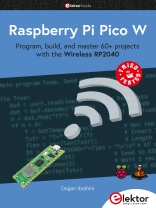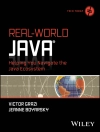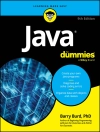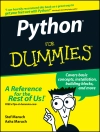The Raspberry Pi Pico and Pico W are based on the fast, efficient, and low-cost dual-core ARM Cortex M0+ RP2040 microcontroller chip running at up to 133 MHz and sporting 264 KB of SRAM and 2 MB of Flash memory. Besides spacious memory, the Pico and Pico W offer many GPIO pins, and popular peripheral interface modules like ADC, SPI, I2C, UART, PWM, timing modules, a hardware debug interface, and an internal temperature sensor.
The Raspberry Pi Pico W additionally includes an on-board Infineon CYW43439 Bluetooth and Wi-Fi chipset. At the time of writing this book, the Bluetooth firmware was not yet available. Wi-Fi is however fully supported at 2.4 GHz using the 802.11b/g/n protocols.
This book is an introduction to using the Raspberry Pi Pico W in conjunction with the Micro Python programming language. The Thonny development environment (IDE) is used in all of the 60+ working and tested projects covering the following topics:
> Installing the Micro Python on Raspberry Pi Pico using a Raspberry Pi or a PC
> Timer interrupts and external interrupts
> Analogue-to-digital converter (ADC) projects
> Using the internal temperature sensor and external sensor chips
> Using the internal temperature sensor and external temperature sensor chips
> Datalogging projects
> PWM, UART, I2C, and SPI projects
> Using Bluetooth, Wi Fi, and apps to communicate with smartphones
> Digital-to-analogue converter (DAC) projects
All projects are tried & tested. They can be implemented on both the Raspberry Pi Pico and Raspberry Pi Pico W, although the Wi-Fi- based subjects will run on the Pico W only. Basic programming and electronics experience are required to follow the projects. Brief descriptions, block diagrams, detailed circuit diagrams, and full Micro Python program listings are given for all projects. The full program listings of all the projects discussed in the book may be downloaded free of charge www.elektor.com/20335.
Mengenai Pengarang
Prof Dogan Ibrahim has a BSc, Hons. degree in Electronic Engineering, an MSc degree in Automatic Control Engineering, and a Ph D degree in Digital Signal Processing.
Dogan has worked in many industrial organizations before he returned to academic life. He is the author of over 70 technical books and has published over 200 technical articles on electronics, microprocessors, microcontrollers, and related fields.












